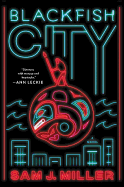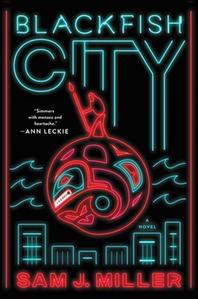
 Blackfish City is Sam J. Miller's adult science fiction follow-up to his debut young adult novel, The Art of Starving, and establishes a dystopian world that stands apart in a crowded field. Miller's take on climate change-fueled dystopia has some superficial similarities to the work of Kim Stanley Robinson and Paolo Bacigalupi; rising sea levels are just one of a number of threats unleashed by global warming, and humanity hastens its own collapse through wars, religious fundamentalism and genocide. Blackfish City distinguishes itself by a number of idiosyncratic touches. An "orcamancer" arrives in Qaanaaq--a floating city under the laissez-faire rule of a collection of AI and mysterious "shareholders"--and sets off ripple effects in the lives of each of the novel's many characters.
Blackfish City is Sam J. Miller's adult science fiction follow-up to his debut young adult novel, The Art of Starving, and establishes a dystopian world that stands apart in a crowded field. Miller's take on climate change-fueled dystopia has some superficial similarities to the work of Kim Stanley Robinson and Paolo Bacigalupi; rising sea levels are just one of a number of threats unleashed by global warming, and humanity hastens its own collapse through wars, religious fundamentalism and genocide. Blackfish City distinguishes itself by a number of idiosyncratic touches. An "orcamancer" arrives in Qaanaaq--a floating city under the laissez-faire rule of a collection of AI and mysterious "shareholders"--and sets off ripple effects in the lives of each of the novel's many characters.
These include a wealthy dilettante, a political functionary, Qaanaaq's version of a bike messenger, a fighter and the mysterious broadcaster of City Without a Map, a kind of radio program that provides insights into the history and present-day realities of Qaanaaq. Then there's "the breaks," a bizarre illness ravaging the population and providing its sufferers with unexplained visions. It might seem like a lot to juggle in a slim, 300-page novel, but Miller manages by moving at a rapid pace--chapters are short and events occur quickly. While Miller is not shy about getting into the nitty-gritty of world-building and futuristic speculation, he can be refreshingly economical when it comes to moving the plot forward.
Blackfish City has many layers, but frequently revolves around the orcamancer, one of the last of a persecuted race of people who bonded with animals through nanotechnology. She makes quite an entrance, accompanied by a killer whale and a polar bear. Her purposes intersect with those of the other characters, some of whom are investigating "the breaks" or uncovering the person behind the City Without a Map. Eventually, the characters become embroiled in a larger skirmish between an ambitious gang leader and one of the shareholders. The ensuing violence is often accompanied by Miller's meditations on how to form a stable, ethical relationship with nature. The orcamancer unsettles so many in the city because she offers an alternative to a relationship with nature founded on opposition and resource extraction.
In Blackfish City, the climate and the environment are not the most pressing threats to humanity's survival. Base human impulses such as fear and greed are far more destructive, and the novel is committed to exploring the distortions caused by inequality. As one characters says: "It's not my fault I live a good life and other people are living god-awful ones because of things my grandfather might have done... but... the real problem is, once you do know what they did, doesn't it make you obligated to do something about it?" Questions of fairness and justice are ever-present in Blackfish City, where the characters must reckon with the sins of the past in order to forge a hopeful future. --Hank Stephenson, bookseller, Flyleaf Books, Chapel Hill, N.C.
Shelf Talker: For the inhabitants of the floating city of Qaanaaq, in a dystopic future where climate change threatens human survival, a strange "orcamancer" might offer the only glimmer of hope.

